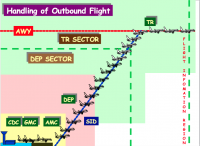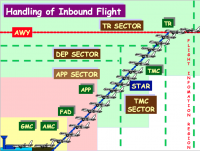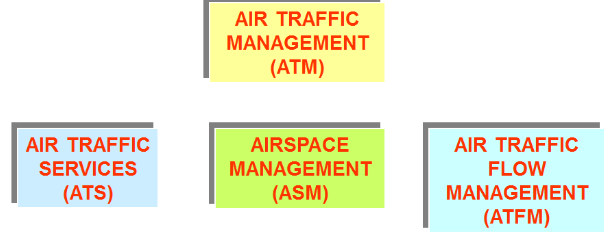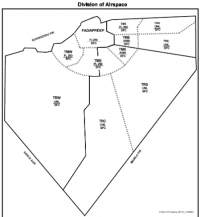Difference between revisions of "Introduction of ATC and working Position"
| (22 intermediate revisions by the same user not shown) | |||
| Line 54: | Line 54: | ||
=== Aerodrome Movement Controller (AMC) === | === Aerodrome Movement Controller (AMC) === | ||
| − | 1.AMN | + | 1. AMN |
* Hours of Operation: H24 | * Hours of Operation: H24 | ||
* Primary Responsibilities: Air Movement in designated Area | * Primary Responsibilities: Air Movement in designated Area | ||
When RWY 25R is in use, TWY A and TWY B between TWY A1 and up to and | When RWY 25R is in use, TWY A and TWY B between TWY A1 and up to and | ||
| − | including TWY A6 are delegated to AMN. | + | including TWY A6 are delegated to AMN.<br> |
| − | 2.AMS | + | |
| + | 2. AMS | ||
* Hours of Operation: H24 | * Hours of Operation: H24 | ||
* Primary Responsibilities: Air Movement in designated Area | * Primary Responsibilities: Air Movement in designated Area | ||
On RWY 07R/25L, the area between the CAT II holding points and the runway at | On RWY 07R/25L, the area between the CAT II holding points and the runway at | ||
K1 and K7 is delegated to AMS for the purpose of glide-path protection. | K1 and K7 is delegated to AMS for the purpose of glide-path protection. | ||
| + | |||
=== Zone Controller (ZNC) === | === Zone Controller (ZNC) === | ||
* Hours of Operation: H24 | * Hours of Operation: H24 | ||
| Line 71: | Line 73: | ||
* Primary Responsibilities: FIS, a non-radar service to non-IFR in the Uncontrolled Aircraft Reporting Areas (UCARAs). | * Primary Responsibilities: FIS, a non-radar service to non-IFR in the Uncontrolled Aircraft Reporting Areas (UCARAs). | ||
=== Terminal Controller (TMC) === | === Terminal Controller (TMC) === | ||
| − | 1.TME Terminal East | + | 1.TME Terminal East<br> |
| − | 2.TMS Terminal South | + | 2.TMS Terminal South<br> |
| − | 3.TMW Terminal West | + | 3.TMW Terminal West<br> |
| − | * Hours of Operation: H24 | + | * Hours of Operation: H24<br> |
| − | Detail AOR and Sector Combine Read This... | + | Detail AOR and Sector Combine Read This... <br> |
| − | * Primary Responsibilities: Their task is to stream arrivals from TR sectors into an orderly flow to APP in accordance with relevant instructions from FLC. | + | * Primary Responsibilities: Their task is to stream arrivals from TR sectors into an orderly flow to APP in accordance with relevant instructions from FLC.<br> |
| + | |||
=== Enroute Executive (EE) === | === Enroute Executive (EE) === | ||
| − | TRE | + | # TRE |
| − | TRK | + | # TRK |
| − | TRS | + | # TRS |
| − | TRC | + | # TRC |
| − | TRV | + | # TRV |
| − | TRW | + | # TRW |
* Hours of Operation: H24 | * Hours of Operation: H24 | ||
* Primary Responsibilities: ensure aircraft are maintaining the level assigned by the sector Planner before leaving Hong Kong FIR. Any change in the assigned level must be approved by the sector Planner to ensure accurate transfer data to adjacent ACC/ATCU | * Primary Responsibilities: ensure aircraft are maintaining the level assigned by the sector Planner before leaving Hong Kong FIR. Any change in the assigned level must be approved by the sector Planner to ensure accurate transfer data to adjacent ACC/ATCU | ||
| + | |||
=== Planner (PLN) === | === Planner (PLN) === | ||
* Hours of Operation: Depend on Traffic | * Hours of Operation: Depend on Traffic | ||
| Line 122: | Line 126: | ||
== Air Traffic Management (ATM) and scopes == | == Air Traffic Management (ATM) and scopes == | ||
| + | [[File:Atm-scope.png]] | ||
| + | |||
| + | The objectives of ATS, as stated in [https://www.pilot18.com/wp-content/uploads/2017/10/Pilot18.com-ICAO-Annex-11-Air-Traffic-Services.pdf ICAO Annex 11], are to | ||
| + | # prevent collisions between aircraft; | ||
| + | # prevent collisions between aircraft on the maneuvering area and obstructions on that area; note that this objective does not include the apron and ATS in general is not intended to prevent collision with terrain. | ||
| + | # expedite and maintain an orderly flow of air traffic; | ||
| + | # provide advice and information useful for the safe and efficient conduct of flights; | ||
| + | # notify appropriate organizations regarding aircraft in need of search and rescue aid and assist such organizations as required. | ||
| + | |||
| + | |||
| + | Air Traffic Control Service to accomplish objectives 1, 2 & 3 above and this service is divided into: | ||
| + | a. Area control service for objectives 1 & 3. | ||
| + | b. Approach control service for objectives 1 & 3. | ||
| + | c. Aerodrome control service for objectives 1, 2 & 3. | ||
| + | Flight Information Service to accomplish objective 4 above. | ||
| + | Alerting Service to accomplish objective 5 above. | ||
| + | |||
| + | |||
| + | The air traffic control (ATC) service is established to accomplish the first three objectives. While the first and third are universally applicable to all ATC units, the second one is only relevant to aerodrome control units. The fourth objective is covered by the flight information service (FIS) and the last one is the alerting service. | ||
| + | |||
| + | The advisory service has no specific objectives defined. It is considered a temporary measure to facilitate the smoother transition from FIS to ATC. | ||
| + | |||
| + | Air Traffic Management is the aggregation of the airborne and ground-based functions required to ensure the safe and efficient movement of aircraft during all phases of operations to enable aircraft operators to meet their planned times of departure and arrival and adhere to their preferred flight profiles with minimum constraints and without compromising agreed levels of safety. | ||
| + | |||
| + | '''Air Traffic Services (ATS)''', A generic term meaning air traffic control service which includes : | ||
| + | area control service | ||
| + | approach control service and | ||
| + | aerodrome control service | ||
| + | air traffic advisory service | ||
| + | flight information service | ||
| + | alerting service | ||
| + | |||
== Divisions of Airspace == | == Divisions of Airspace == | ||
| + | Hong Kong's Division of Airspace in general divides into East, South, West Sector. The General Radar Sector Area and Vertical Limits are displayed in the diagram The detailed [[Areas-of-Responsibility]] that will be discussed in later chapters. | ||
| + | |||
| + | [[File:Division of-airspace.png|thumb|200px|Divisions of Airspace with Sector Limits]] | ||
| + | |||
== See Also == | == See Also == | ||
[[Abbreviations]] | [[Abbreviations]] | ||
== External links == | == External links == | ||
[https://ais.gov.hk/ HKAIS] | [https://ais.gov.hk/ HKAIS] | ||
| + | |||
[https://aishk.000webhostapp.com/ HKeAIP(Direct Link)] | [https://aishk.000webhostapp.com/ HKeAIP(Direct Link)] | ||
| + | |||
| + | [https://ssd.dhmi.gov.tr/PublishingImages/DOC%208400%20ICAO%20Abbreviations%20and%20Codes_Ninth%20Edition.pdf ICAO 8400 Abbreviations and Codes 9th Ed, 2016] | ||
| + | |||
== DISCLAIMER == | == DISCLAIMER == | ||
THE CONTENT OF THIS MEDIAWIKI RESSOURCE WEBSITE IS INTENDED FOR AVIATION '''SIMULATION ONLY''' AND MUST <span style="color:red">NOT BE USED </span> FOR REAL AVIATION OPERATIONS. | THE CONTENT OF THIS MEDIAWIKI RESSOURCE WEBSITE IS INTENDED FOR AVIATION '''SIMULATION ONLY''' AND MUST <span style="color:red">NOT BE USED </span> FOR REAL AVIATION OPERATIONS. | ||
IVAO WILL BE NOT RESPONSIBLE FOR THE MISUSE OF THESE RESOURCES OUTSIDE ITS NETWORK | IVAO WILL BE NOT RESPONSIBLE FOR THE MISUSE OF THESE RESOURCES OUTSIDE ITS NETWORK | ||
Latest revision as of 16:01, 9 October 2020
Contents
Introduction
The Hong Kong Air Traffic Controllers are usually divided into Two Types which are Radar or Non-Radar Controllers. Controllers are either Tower Controllers or Radar Controllers.
- Tower Controllers
- Radar Controllers.
Radar Controllers include Departures, Approach, Terminal, and Enroute Radar Positions
The Three Main Streams are:
- Tower Stream
- Approach Stream
- Enroute Stream
These terminologies will be further discussed in the SPRAT course regarding their Areas of Responsibility (AOR)
ATC Working Positions
Air traffic controllers in Hong Kong work in a team and their Position can mainly be divided into Tower Controllers and Radar Controllers. In the Aerodrome Tower Environment, there are CDC,GMC,AMC,ZNC and FIS. The normal Flow of an Aircraft Departs from an Aerodrome and Land in an Aerodrome is as follows: This is an example of an aircraft departing VHHH
- Aircraft Contacts CDC for IFR clearance
- Aircraft Contacts GMC for Push back and Taxi clearance
- Aircraft Contacts AMC for Take off Clearance
- Aircraft Contacts DEP for Radar Services which includes Radar Identification and a Higher Altitude
- Aircraft Contacts EE for Radar Services, Higher Altitude and for radar separation if required
This is an example of an aircraft arriving VHHH from RCAA (Taiwan FIR)
- Aircraft Contacts EE for Radar Identification, STAR clearance
- Aircraft Contacts TMC for Flow control, Holding Patterns as aircraft approaches Hong Kong
- Aircraft Contacts APP for Sequencing, Radar Separation, Fine Speed Control, and Vectoring as Aircraft Enters APP airspace.
- Aircraft Contacts FAD during 0200-1000, For Finer Sequence inside the Corridor of the APP Path
- Aircraft Contacts AMC for Clearance to Land
- Aircraft Contacts GMC for Clearance to taxi to Bay
Clearance Delivery Controller (CDC)
- Hours of Operation: H24
- Operational Hours: 1630-2330 , later absorbed by GMS
- Primary Responsibilities: Issue IFR Clearance
Ground Movement Controller (GMC)
1. GMN
- Hours of Operation: H24
- Primary Responsibilities: Ground Movement in designated Area
2. GMS
- Hours of Operation: H24
- Primary Responsibilities: Ground Movement in designated Area
3. GMM
- Hours of Operation: 00:00-16:00
- Primary Responsibilities: Ground Movement in designated Area
Aerodrome Movement Controller (AMC)
1. AMN
- Hours of Operation: H24
- Primary Responsibilities: Air Movement in designated Area
When RWY 25R is in use, TWY A and TWY B between TWY A1 and up to and
including TWY A6 are delegated to AMN.
2. AMS
- Hours of Operation: H24
- Primary Responsibilities: Air Movement in designated Area
On RWY 07R/25L, the area between the CAT II holding points and the runway at K1 and K7 is delegated to AMS for the purpose of glide-path protection.
Zone Controller (ZNC)
- Hours of Operation: H24
- Primary Responsibilities: non-IFR flight within CTR Zone
Flight Information Service (FIS)
- Hours of Operation: 0100-SS(Sunset)
- Primary Responsibilities: FIS, a non-radar service to non-IFR in the Uncontrolled Aircraft Reporting Areas (UCARAs).
Terminal Controller (TMC)
1.TME Terminal East
2.TMS Terminal South
3.TMW Terminal West
- Hours of Operation: H24
Detail AOR and Sector Combine Read This...
- Primary Responsibilities: Their task is to stream arrivals from TR sectors into an orderly flow to APP in accordance with relevant instructions from FLC.
Enroute Executive (EE)
- TRE
- TRK
- TRS
- TRC
- TRV
- TRW
- Hours of Operation: H24
- Primary Responsibilities: ensure aircraft are maintaining the level assigned by the sector Planner before leaving Hong Kong FIR. Any change in the assigned level must be approved by the sector Planner to ensure accurate transfer data to adjacent ACC/ATCU
Planner (PLN)
- Hours of Operation: Depend on Traffic
- Primary Responsibilities: Manage his/her respective sector by carefully planning traffic flow for EE taking by taking account to equipment status, weather situation, airspace restrictions
| Positions | Frequency (MHz) |
|---|---|
| CDC | 122.15 |
| GMN | 121.6 |
| GMS | 122.55 |
| AMN | 118.2 |
| AMS | 118.4 |
| ZNC | 120.6 |
| FIS | 121.0 |
| DEP | 123.8 |
| DEH | 122.0 |
| APP | 119.1 |
| FAD | 119.5 |
Note:
- CDC previously used 121.9 but recently Changed to new frequency AIP SUPP 13/20 WEF 200910
- ATC Frequencies
- For Enroute (HKAIP ENR 6.7 Hong Kong ATC Sector Boundaries Chart)
- For Aerodrome (HKAIP AD 2.18 ATS COMMUNICATION FACILITIES)
Air Traffic Management (ATM) and scopes
The objectives of ATS, as stated in ICAO Annex 11, are to
- prevent collisions between aircraft;
- prevent collisions between aircraft on the maneuvering area and obstructions on that area; note that this objective does not include the apron and ATS in general is not intended to prevent collision with terrain.
- expedite and maintain an orderly flow of air traffic;
- provide advice and information useful for the safe and efficient conduct of flights;
- notify appropriate organizations regarding aircraft in need of search and rescue aid and assist such organizations as required.
Air Traffic Control Service to accomplish objectives 1, 2 & 3 above and this service is divided into:
a. Area control service for objectives 1 & 3. b. Approach control service for objectives 1 & 3. c. Aerodrome control service for objectives 1, 2 & 3.
Flight Information Service to accomplish objective 4 above. Alerting Service to accomplish objective 5 above.
The air traffic control (ATC) service is established to accomplish the first three objectives. While the first and third are universally applicable to all ATC units, the second one is only relevant to aerodrome control units. The fourth objective is covered by the flight information service (FIS) and the last one is the alerting service.
The advisory service has no specific objectives defined. It is considered a temporary measure to facilitate the smoother transition from FIS to ATC.
Air Traffic Management is the aggregation of the airborne and ground-based functions required to ensure the safe and efficient movement of aircraft during all phases of operations to enable aircraft operators to meet their planned times of departure and arrival and adhere to their preferred flight profiles with minimum constraints and without compromising agreed levels of safety.
Air Traffic Services (ATS), A generic term meaning air traffic control service which includes :
area control service approach control service and aerodrome control service air traffic advisory service flight information service alerting service
Divisions of Airspace
Hong Kong's Division of Airspace in general divides into East, South, West Sector. The General Radar Sector Area and Vertical Limits are displayed in the diagram The detailed Areas-of-Responsibility that will be discussed in later chapters.
See Also
External links
ICAO 8400 Abbreviations and Codes 9th Ed, 2016
DISCLAIMER
THE CONTENT OF THIS MEDIAWIKI RESSOURCE WEBSITE IS INTENDED FOR AVIATION SIMULATION ONLY AND MUST NOT BE USED FOR REAL AVIATION OPERATIONS.
IVAO WILL BE NOT RESPONSIBLE FOR THE MISUSE OF THESE RESOURCES OUTSIDE ITS NETWORK



